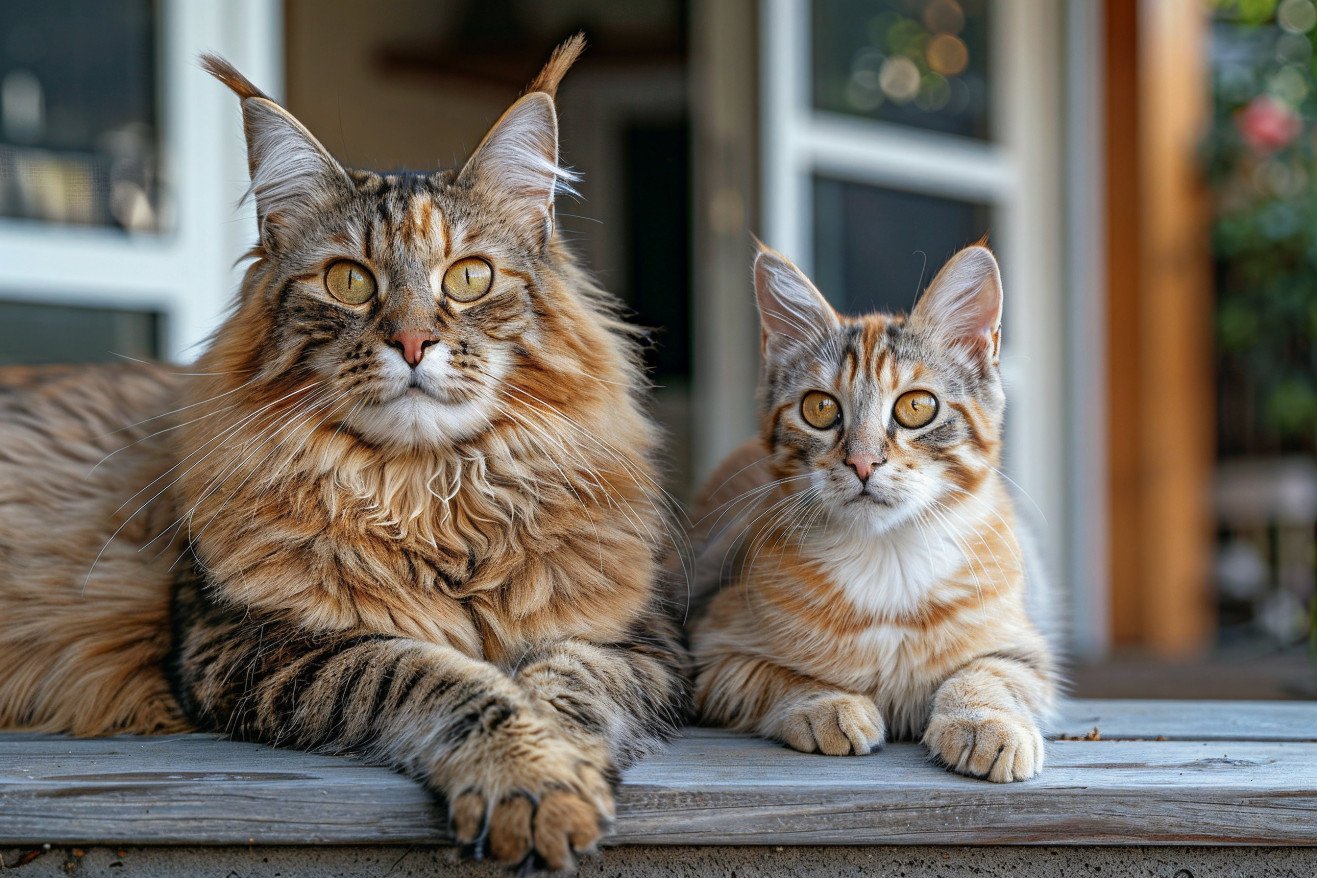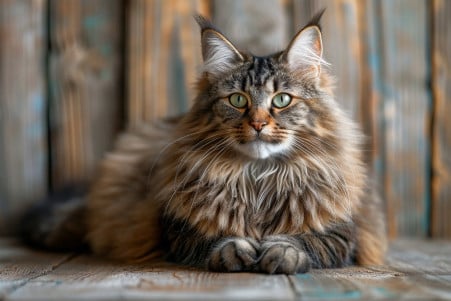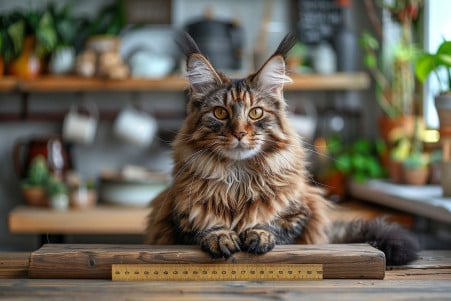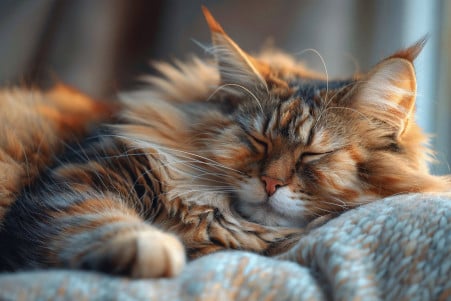Maine Coon vs. Domestic Cat: What Makes the Majestic Breed Different?
24 May 2024 • Updated 23 May 2024

If you're asking yourself this question, you're not alone. The Maine Coon is one of the largest domesticated cat breeds, and it's known for its long, flowing coat, rectangular body shape, and friendly, laid-back temperament that makes it an ideal pet for families. These traits are quite different from those of the average, smaller, more active "domestic" cat.
To compare the Maine Coon, which is one of the most popular cat breeds in the world, to other domestic cats, we'll look at studies that have been done on the breed's physical traits, behavior, and history. By reviewing research in the fields of veterinary science, genetics, and animal behavior, you'll learn about the things that really set these "gentle giants" apart and be able to decide if this majestic feline friend is the right fit for you.
What makes the Maine Coon cat different from a normal domestic cat?
Unique Physical Characteristics: Size, Fur, and Other Features
Maine Coons are regal cats that are easily distinguishable from the average house cat due to their large size and other unique physical characteristics. As one of the largest domesticated cat breeds, Maine Coons can weigh between 12-18 pounds for males and 8-12 pounds for females, which is much larger than the average 9-10 pound house cat. Their bodies are long and rectangular and their muscles are well-developed, making them look even larger. In fact, they can be up to 40 inches long and 10-16 inches tall.
However, it's their fur that really makes Maine Coons stand out. They have a double coat with a coarse, water-resistant outer layer and a soft, downy undercoat, according to the Lincolnway Veterinary Clinic. Their fur is longer on their stomach and rear and shorter on their back and sides, and it's especially long on their tail. Their fur also grows longer around their neck and chest, which is why it's often referred to as a mane. Their fur is also shaggy and can come in a variety of colors and patterns.
Maine Coons also have other unique physical characteristics, including large, oval-shaped eyes that come in gold, green, and amber. Their ears are also large and pointed and have tufts of fur at the tips, which makes them look like a lynx's ears. Their tails are long and bushy, measuring 12-18 inches, which is much longer than the average house cat's tail, which is only about 10 inches long.
Maine Coons' wild and regal appearance makes them look especially different from the average house cat. As Untamed explains, their fur can grow into a mane, which makes them look even more regal. Their large size and unique appearance make them look especially different from the average house cat.
Personality and Behavior: Gentle Giants vs. Independent Companions
Maine Coons are often called the "dogs of the cat world" because of their outgoing, friendly, and loving nature. According to Untamed, Maine Coons are much more interactive and attached to their owners than the independent and standoffish personality of the average domestic cat.
Maine Coons are also highly intelligent and trainable, and they can be taught tricks and will adapt to new living situations. The Catster says Maine Coons are more likely to be vocal and talkative with their owners, using a variety of meows, chirps, and trills to communicate.
This is in contrast to the average domestic cat, which tends to be less trainable and less likely to vocalize. LOL Cats says that while Maine Coons are known for their sweet, loving disposition, individual cats' personalities can differ, and proper socialization is important. People considering adopting a Maine Coon need to be ready to give them the attention and affection they need to be happy as "gentle giants."
Genetic Origins and Ancestry: From Viking Ship Cats to Modern Breeds
The Maine Coon's genetic origins and ancestry can be traced back to the Viking ship cats of the seafaring Norsemen, who are thought to have brought the breed to North America. The Lincolnway Veterinary Clinic reports that the most widely accepted theory is that Maine Coons are the result of short-haired domestic cats mating with long-haired cats that were brought to North America from Europe on Viking ships.
Although Maine Coons are now recognized as a separate purebred breed, they are genetically related to domestic shorthair and longhair cats. Mountain Peak Mainecoons says that domestic cats make up 97% of the world's cat population and their DNA has changed very little over the past 10,000 years. As a result, many domestic cats may have Maine Coon ancestors, which would explain the similarities in their physical appearance.
It's important to maintain the genetic purity of purebred Maine Coons because breeding with domestic cats can result in the loss of the breed's unique traits. The Catster points out that the 'M' marking on the forehead, which is often associated with Maine Coons, is actually a common tabby pattern trait and not unique to the breed. Reputable breeders work to ensure that the Maine Coon's distinctive physical and personality traits are preserved through selective breeding.
Health Concerns and Genetic Predispositions: Preventative Care for Maine Coons
Although Maine Coons are generally healthy cats, there are some health concerns and genetic predispositions that owners should keep in mind. Per Untamed, some of the hereditary issues that Maine Coons are predisposed to include spinal muscular atrophy (SMA), hypertrophic cardiomyopathy (HCM), hip dysplasia, stomatitis, and polycystic kidney disease (PKD).
On the other hand, Catster explains that while common house cats can also suffer from genetic disorders like diabetes and dental disease, Maine Coons are more likely to experience these health problems. This makes it important for Maine Coon owners to be proactive about their cats' health, with PetMD noting that annual echocardiograms can help detect HCM and at-home DNA tests can identify PKD before symptoms arise.
To ensure that Maine Coons are as healthy as possible and live as long as possible, Dr. Judy Morgan's Naturally Healthy Pets recommends a diet that's high in protein and low in carbohydrates and regular grooming. By making sure that these needs are met, owners can help reduce the likelihood that their Maine Coon will suffer from any of the health problems that are common in the breed. With the right care, these big, sweet cats can live long, healthy lives.
Grooming and Care Essentials: How to Meet the Needs of a Majestic Feline
The Maine Coon’s long, shaggy coat requires regular grooming. Per PBS Pet Travel, their fur is long and thick and should be brushed every day to prevent matting and help distribute natural oils. It’s best to start a grooming routine when the cat is a kitten, and a soft brush can help make the experience more enjoyable for the cat and the person doing the grooming.
In addition to brushing, Maine Coons should be bathed once a month to keep their water-resistant coats clean and prevent dander. PetCareRx recommends using a rubber brush or an electric grooming tool to help with shedding. Nails should be trimmed and teeth should be brushed to maintain a Maine Coon’s health, although these tasks may require professional help from a vet.
It’s also important to make sure that Maine Coons get the proper nutrition, which includes a diet that’s high in protein and low in carbs. WebMD notes that it’s important to make sure the cats have access to fresh water and high-quality cat food throughout the day. It’s also important to make sure that the cats have plenty of enrichment and space to roam. While Maine Coons have lower grooming needs than some other long-haired cats, their size and other unique needs mean that they require special care to ensure that they stay healthy and happy.
Planning Your Cat Budget: How Much Does It Cost to Own a Maine Coon?
The cost of a Maine Coon from a reputable breeder is typically between $1,000 and $2,000 or more, according to Money. Meanwhile, adopting a Maine Coon from a shelter or rescue group is generally much less expensive, although it may be more difficult to find a purebred cat.
In addition to the purchase price, there are several other costs associated with owning a Maine Coon. Spot® notes that monthly expenses can include anywhere from $20 to $60 for food, $15 to $25 for litter, $10 to $20 for grooming, and $20 to $40 for veterinary care. Medical expenses for breed-specific conditions such as hip dysplasia can cost hundreds or even thousands of dollars.
When you take these expenses into account, Catastic projects that the total lifetime cost of owning a Maine Coon will be between $5,250 and $21,250. With a lifespan of around 15 years, this means that anyone interested in adopting a Maine Coon will need to make sure they can afford to provide the special care that these large, loving cats need.
Conclusion: Finding the Right Maine Coon for You
If you’re thinking about getting a Maine Coon, it’s important to understand how these majestic cats differ from other domestic felines. From their size and appearance to their personality and care needs, Maine Coons are unique in many ways.
While their size, affectionate nature, and trainability make them an attractive choice for a pet, it’s important to understand the special care requirements of these "gentle giants." Proper socialization, a high-protein diet, and regular grooming are all important for keeping a Maine Coon healthy and happy.
As a result, it’s important to think carefully about whether a Maine Coon is the right pet for you. Before bringing one of these regal felines into your home, make sure you understand the time and money you’ll need to invest in caring for them. This way, you can ensure that you and your new Maine Coon will enjoy a happy, healthy, and rewarding life together.


